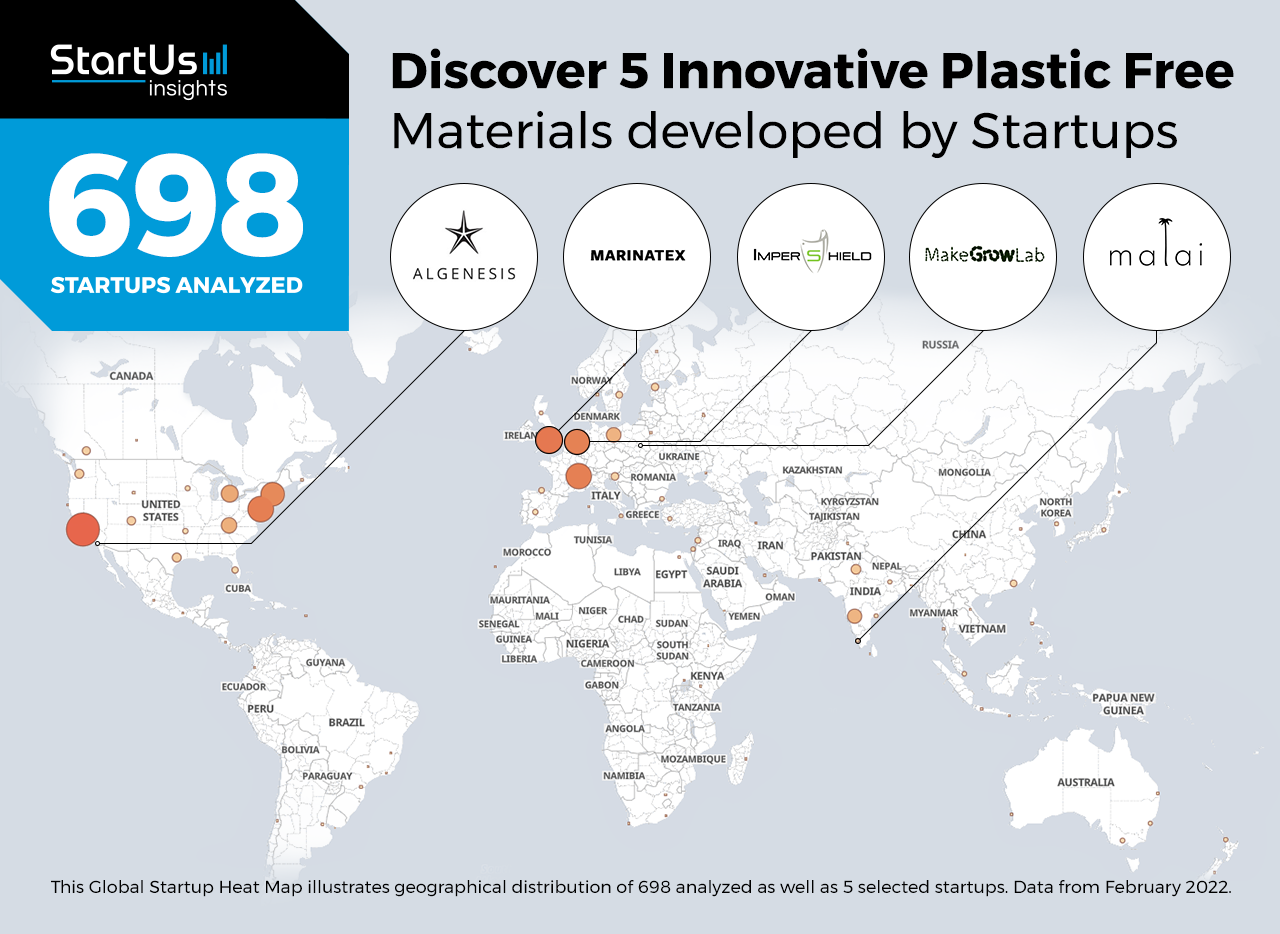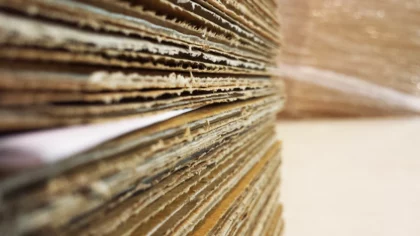Staying ahead of the technology curve means strengthening your competitive advantage. That is why we give you data-driven innovation insights into the materials industry. This time, you get to discover five hand-picked plastic free materials developed by startups.
Out of 698, the Global Startup Heat Map highlights 5 Top Innovative Plastic Free Materials developed by Startups
The insights of this data-driven analysis are derived from the Big Data & Artificial Intelligence (AI)-powered StartUs Insights Discovery Platform, covering 2 093 000+ startups & scaleups globally. The platform gives you an exhaustive overview of emerging technologies & relevant startups within a specific field in just a few clicks.
The Global Startup Heat Map below reveals the distribution of the 698 exemplary startups & scaleups we analyzed for this research. Further, it highlights five materials startups that we hand-picked based on criteria such as founding year, location, funding raised, and more. You get to explore the solutions of these five startups & scaleups in this report. For insights on the other 693 plastic free materials developed by startups, get in touch with us.
Algenesis produces Algae-based Materials
Founding Year: 2016
Location: San Diego, US
Funding: USD 2,4 M
Partner for Biodegradable Packaging
US-based startup Algenesis produces algae-based biodegradable materials. The startup’s Soleic technology uses algae oil to manufacture polyurethane monomers. Unlike fossil fuel-based plastic material produced from crude oil, algae oil is extracted from live algae which is a renewable source. Thus, the startup’s proprietary material degrades naturally in soil. It is viable for use in multiple industries like footwear, and packaging, among others.
MarinaTex develops Compostable films
Founding Year: 2019
Location: Brighton, UK
Funding: GBP 30 000
Collaborate with MarinaTex for Single-use Plastic Alternatives
British startup MarinaTex develops biobased alternatives to single-use plastics. The startup’s technology uses red algae and organic waste from fisheries as a source for the production of MarinaTex material. The material is translucent and has higher tensile strength than low-density polyethylene (LDPE). The startup’s bioplastic takes a month to decompose and is viable for use as domestic compost. MarinaTex’s material effectively replaces single-use plastics by utilizing organic waste, as well as reducing environmental pollution.
Impershield offers Biobased Coatings
Founding Year: 2018
Location: Bergen op Zoom, Netherlands
Partner for Biobased Polymers
Dutch startup Impershield offers biobased products for coating and impregnating surfaces. The startup aims to discover and implement ingredients used by Mayans, as the color pigments and coatings have survived for many centuries. Imperishield works on replicating the natural mix of resin, oils from local plants, and trees used by Mayans as alternatives to plastic-based coatings. The startup offers Euroflex, a water-based eco-friendly sealant produced from fermented plant sources. Impershield also provides StoneSeal impregnators for mineral surface protection and BioSeal for concrete coating.
Malai Biomaterials Design makes Coir-based Materials
Founding Year: 2018
Location: Cherthala, India
Reach out for Ecofriendly Biomaterials
Indian startup Malai Biomaterials specializes in producing coconut coir-based materials. The startup designs and manufactures biocomposites using coconut coir, coconut water, and banana fiber. Malai Biomaterials’ products are labeled as vegan and are naturally sourced and developed. Specifically, Malai bags are sturdy and are biodegradable post use. The startup’s plastic free sustainable fashion solution won the circular design challenge at Lakme Fashion Week.
MakeGrowLab provides Biomaterial Packaging
Founding Year: 2019
Location: Pulawy, Poland
Funding: USD 350 000
Partner for Waste Upcycling
Polish startup MakeGrowLab produces biomaterial packaging from food waste. The startup develops innovative plastic-free materials by fermenting food waste. MakeGrowLabs’s patented material is viable for use as alternative packaging to conventional single use plastics. It finds applications in industries like cosmetics, consumer goods packs, and more. A pure form of cellulose, it doesn’t have any trace of petroleum-based additives and other toxic substances. The material is recyclable, biodegradable, and compostable, thereby ensuring circularity.
Discover more Materials Startups
Materials startups such as the examples highlighted in this report focus on biodegradable materials, bioplastics, and other biobased materials. While all of these technologies play a major role in advancing the materials industry, they only represent the tip of the iceberg. To explore materials technologies in more detail, simply let us look into your areas of interest. For a more general overview, download our free Materials Innovation Report to save your time and improve strategic decision-making.









